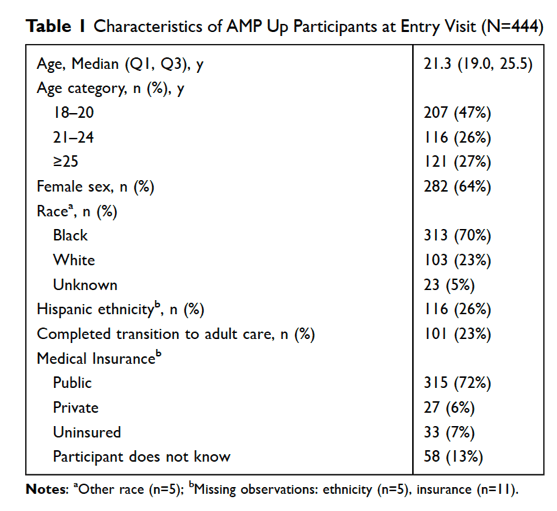| |
Association of Perceived Social Support with Viral Suppression Among Young Adults with Perinatally-Acquired HIV in the US-based Pediatric HIV/AIDS Cohort Study (PHACS)
|
| |
| |
Download the PDF here
Young adults with PHIV in the US who perceive low levels of social support in their lives are less likely to be virally suppressed.
Purpose: To determine the relationship between perceived social support and viral suppression among young adults with perinatally-acquired HIV (YAPHIV).
Participants and Methods: We included YAPHIV ≥ 18 years enrolled in AMP Up, a study of PHACS (Pediatric HIV/AIDS Cohort Study), with social support evaluations and ≥ 1 HIV viral load (VL) measured over the next year. We evaluated emotional, instrumental, and friendship social support via the NIH Toolbox. We defined social support, measured at study entry and year 3 (if available), as low (T-score ≤ 40), average (41- 59) or high (≥ 60). We defined viral suppression as all VL < 50 copies/mL over the one year after social support measures. We fit multivariable Poisson regression models using generalized estimating equations, and evaluated transition from pediatric to adult care as an effect modifier.
Results: Among 444 YAPHIV, low emotional and instrumental support and friendship at entry were reported by 37%, 32% and 36%. Over the next year, 44% were virally suppressed.
Of 136 with year 3 data, 45% were suppressed. Average or high levels of all three social support measures were associated with higher likelihood of viral suppression. Instrumental support was associated with viral suppression among those in pediatric (adjusted proportion suppressed among those with average/high vs low support=51.2% vs 28.9%; risk ratio (RR)=1.77, 95% confidence interval (CI)=1.37, 2.29), but not adult care (40.0% vs 40.8%; RR=0.98, 95% CI=0.67, 1.44).
Conclusion: Sufficient social support increases likelihood of viral suppression among YAPHIV. Strategies to enhance social support may promote viral suppression as YAPHIV prepare for adult clinical care transition.
Participants who identified as Black were more likely to report low levels of emotional and instrumental support than those identifying as White or other race, while participants who identified as Hispanic were less likely than those who identified as non-Hispanic to report low emotional support.
For young adults who had not yet transitioned from pediatric to adult clinical care, those with low instrumental social support were less likely to have sustained viral suppression compared to those with higher levels of support. The time period spanning this transition is often an uncertain stage of life for those with lifelong chronic health conditions, with disruptions in health insurance coverage45 and loss of child benefits.46 Young persons with PHIV under the care of an attentive clinical team and family, and with consistent adherence to treatment and medical care appointments, can achieve and maintain viral suppression. When anticipating the transition to adult care, the young adult may begin to sense the loss of the relationship with their pediatric providers, who cared for them across childhood and adolescence. It may be challenging to consider developing a similarly supportive relationship with a new provider. This period also corresponds to that of emerging adulthood,47 defined by new relationships and significant increases in responsibilities related to obtaining and maintaining employment, housing, and further education. The anticipation of these additional responsibilities, along with young adults' concern about losing their existing supportive relationships, may increase levels of stress and anxiety. This in turn may prompt inconsistent medication adherence, limited or absent health care participation, and eventual loss of viral suppression. Sufficient levels of social support during the pre-transition period may provide needed help in sustaining health care during this challenging period and also reduce the likelihood of anxiety and other mental health problems,48 all serving to lessen the impact on viral suppression.
Adult-oriented clinical care for chronic health conditions may vary in the provision or linkage to other services such as mental health and sexual/reproductive health49 for young adults affected by HIV. While many adult care programs provide comprehensive services and support, delayed or incomplete linkage to these services at the time of adult health care initiation may temporarily disrupt self-care among young adults with PHIV.

|
|
| |
| |
|
|
|